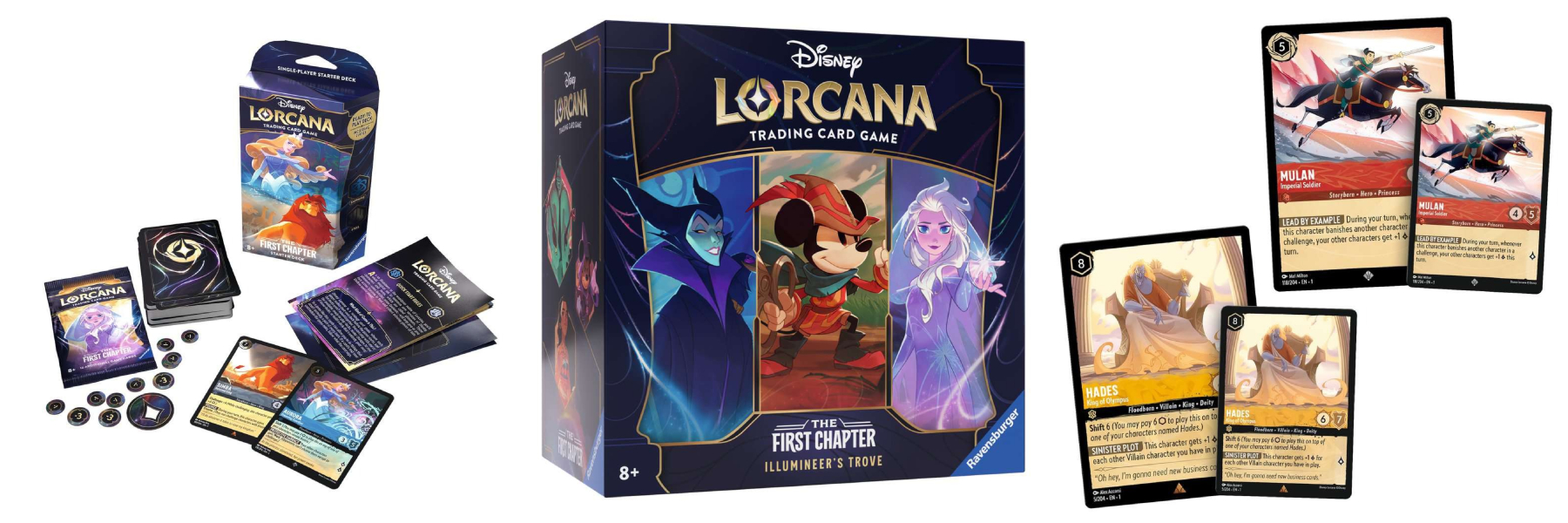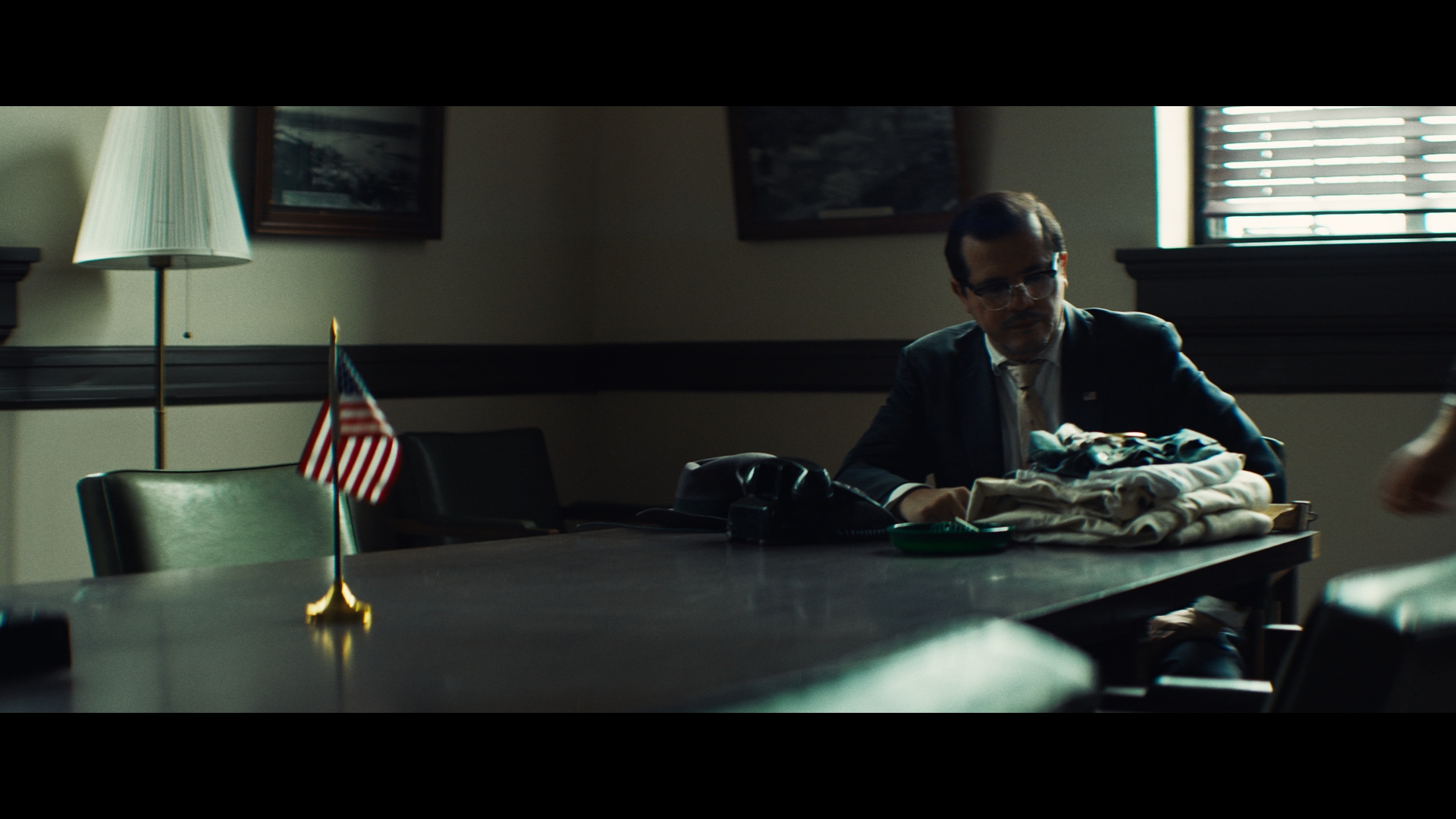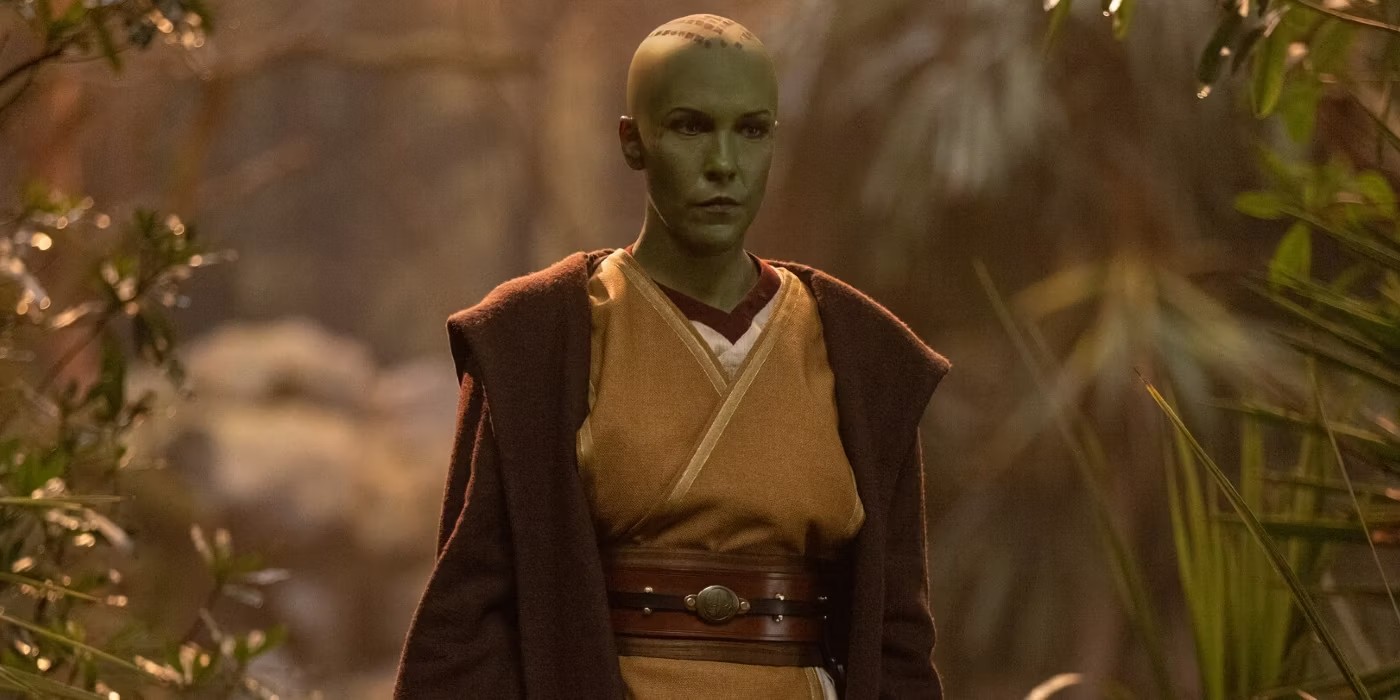Disney Lorcana by Ravensburger
Price: Varies – Starter decks are ~$17.00
Players: 2 (can theoretically be expanded infinitely)
Playtime: ~30 minutes
Perfect for: Players who enjoy quasi-asymmetrical dueling using self-constructed card decks, and fans of Disney in general.
Disney Lorcana is a game of battling Illumineers! Over several rounds, these Illumineers (players) will carefully select characters, items, and actions to counter their opponent’s cards and win the race to victory. Illumineers must successfully balance when to: quest to score points; attack to hamper opponents; or defend to preserve a well-constructed engine. The player who can best outmaneuver their rival by collecting victory points faster will ultimately be triumphant.
Before a game of Disney Lorcana begins, players independently construct their deck. Individuals can purchase their own starter decks and related booster packs to assemble 60+ cards, with certain caveats. First, decks can only contain cards from two “ink types.” These ink types loosely correspond to game play style (i.e., focusing on offense, defense, or questing). Furthermore, a deck may not hold more than four copies of any unique card. However, many characters have multiple versions—only exact replicas fall under this rule.
RELATED: Magic: The Gathering and D&D’s Forgotten Realms Crossover Launches on Magic: The Gathering Arena Today
Once two (or more) Illumineers have their decks, a game of Lorcana may commence. Each player begins with seven cards in their hand. Upon an initial draw, each player has one opportunity to take a mulligan, discarding and redrawing any number of cards in any attempt to optimize their start. On a turn, players: 1) ready their previously exerted cards; 2) resolve any immediate effects; and 3) draw a card. Then, players may perform a variety of actions during the main phase.
Typically in most main phases, and especially at the beginning of the game, players will choose cards (one per turn) to put facedown into their the “inkwell.” The number of cards in the inkwell represents the Illumineers’ buying power—they can exert inked cards to pay for and bring out character, action, and item cards from their hand. During this main phase players may also activate/exert characters and items previously purchased (action cards typically resolve immediately). Generally, characters will either go on quests to collect victory points, or they will attack their opponents’ characters. An important distinction here is that players may only attack rivals’ characters that were previously activated. This means that there is some strategy to NOT exerting a character in order to protect them. Once a player reaches 20 victory points from questing, they win.
What works in Disney Lorcana is the elegant balance of rules, actions, and deck abilities. The core mechanics are relatively simple. As such, after only a few rounds, the general flow becomes smooth and almost automatic as the game does a great job explaining effects right on the cards. The complexity of Lorcana is in the strategy across two main variables: deck construction and gameplay style. Incredible thought has gone into how cards work in tandem, both in terms of internal couplings as well as battle. Individuals will have to consider how to tackle each individual game and encounter based upon the cards they draw, but also how their opponent plays. More pointedly, players must identify synergies and weigh certain risks: what to spend ink on, to attack or quest, etc. The various ways to approach a path to victory changes with every game, keeping Disney Lorcana incredibly fresh and engaging every time it comes to the table.
Players who don’t enjoy games with large potential disparity may not enjoy Disney Lorcana as much as others. Unlike games that play “out of the box,” Lorcana is a trading card game which means each player crafts their own deck after procuring various packs. This mechanic can lend itself to one player having a deck that vastly overpowers an opponent. Lorcana does a pretty decent of job of making all starter decks strong enough in their own right, but this outcome is certainly possible. Related, individuals may not enjoy feeling as though they “must” make additional purchases to maintain a competitive deck. And finally, Disney Lorcana can be a rather competitive experience, so people who dislike direct conflict in their games may want to seek other options.
Disney Lorcana is a fantastic game, especially for those who enjoy the “hunt” to assemble a deck that perfectly fits their style. Furthermore, Lorcana rewards engine-building and creativity in how to leverage multiple cards in combination. For these reasons, and the fact that Lorcana is easy to learn but hard to master, make it highly recommended.
Recommended if you like: Magic the Gathering, Pokémon

 FOR FANBOYS, BY FANBOYS
Have you checked out LRM Online’s official podcasts and videos on The Genreverse Podcast Network? Available on YouTube and all your favorite podcast apps, This multimedia empire includes The Daily CoG, Breaking Geek Radio: The Podcast, GeekScholars Movie News, Anime-Versal Review Podcast, and our Star Wars dedicated podcast The Cantina. Check it out by listening on all your favorite podcast apps, or watching on YouTube!
Subscribe on: Apple Podcasts | Spotify | SoundCloud | Stitcher | Google Play
FOR FANBOYS, BY FANBOYS
Have you checked out LRM Online’s official podcasts and videos on The Genreverse Podcast Network? Available on YouTube and all your favorite podcast apps, This multimedia empire includes The Daily CoG, Breaking Geek Radio: The Podcast, GeekScholars Movie News, Anime-Versal Review Podcast, and our Star Wars dedicated podcast The Cantina. Check it out by listening on all your favorite podcast apps, or watching on YouTube!
Subscribe on: Apple Podcasts | Spotify | SoundCloud | Stitcher | Google Play




